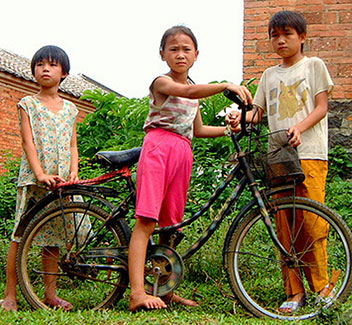Hong researches care arrangements of children orphaned by AIDS


Over 17 million children worldwide have been orphaned from AIDS, and most of these orphans live in poor resource settings. How to care for these vulnerable children remains an urgent public health issue.
Yan Hong, Ph.D., associate professor at the Texas A&M Health Science Center School of Public Health, has been doing research on care arrangement of AIDS orphans for years and just published her recent findings from rural central China. Many children have been orphaned in this area of the world because of unhygienic commercial blood collection since 1990.
“Many orphans experience rejection, increased bullying, social ostracism and numerous health concerns, both mental and physical, as a result of the stigma surrounding the disease,” state Hong. “This makes how this at-risk population is cared for all the more important.”
The study titled, “Community-based family-style group homes for children orphaned by AIDS in rural China: An ethnographic investigation,” published in Health Policy and Planning, provides a detailed description of community-based family-style group homes. Hong and others conducted a series of investigations to better understand the characteristics and function of this relatively new model of care and the potential health outcomes for the orphans. Detailed information on these group homes was documented as well as why children in them had better outcomes than their counterparts in orphanages and kinship care.
Based on years of ethnographic research, Hong and colleagues proposed an ecological framework on the best care model for AIDS orphans in resource poor settings. The framework models a stable home environment composed of dedicated caregivers, positive communication, and a supportive, nurturing neighborhood community that would help shield children from stigma and isolation.
“What we learned from our research will help us design effective care arrangement options not only for AIDS orphans, but other vulnerable children in resource poor settings,” said Hong. The study received funding from National Institute of Mental Health, the National Institute of Nursing Research, and the Texas A&M Health Science Center. Additional researchers include Dr. Peilian Chi, Macau University, China; Drs. Junfeng Zhao and Guoxiang Zhao, Henan University, China; Drs. Xiaoming Li and Bonita Stanton, Wayne State University, Detroit, Michigan; and Dr. Li Li, UCLA, Los Angeles, California.

Media contact: media@tamu.edu


